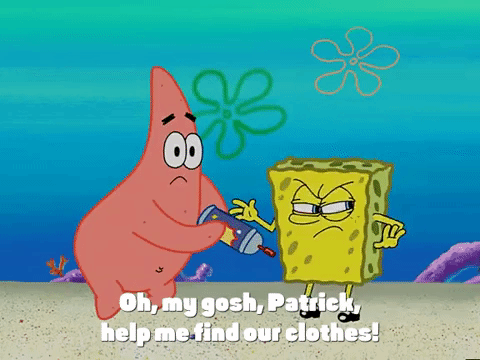Once upon a time, in a galaxy far, far away, I had a solid and rewarding career in financial services.
I helped people buy homes, by lending them money to buy their first, second, or dream homes.
I cut my teeth first working at a broker, then for a Fortune 250 home builder, and finally at a Fortune 5 retail and consumer bank, before leaving for business school and starting a new career path.
Over the course of my lending career, thousands of people got financially naked in front of me.
I looked at their most soul-baring and vulnerable truths, which were:
How much money they made,
How much money they had, and,
Their overall relationship with money.
Content entrepreneur | Agency Founder & CEO | Author | Featured in Forbes, Wall Street Journal, Business Insider, Cheddar TV, HuffPost | Join more than 2,500 people who follow Shindy for lifestyle and business advice:
I was pretty good at my job and was a multi-million dollar producer, but I also coached people to better financial health if they weren’t ready to buy homes right away.
A note on renting vs. buying: There’s nothing wrong with renting if it suits your lifestyle and goals — a concept Ramit Sethi discusses in his book, I Will Teach You to Be Rich.
During my career however, I observed the following truths and even debunked a few myths:
Truths, debunked myths, career observations
Not all doctors are rich or wealthy
(Take that, tiger Chinese moms, lol). In fact many are saddled with hundreds of thousands of dollars in student loan debt. Ouch.Your culture determines how you spend money
It comes as no surprise that how you’re raised and what you’re taught dictates how you behave with money, from stockpiling cash to saving nothing month-to-month. Unfortunately, if your parents didn’t teach you about saving or spending, then you’ll have to learn by mistakes, experience, and lots of reading.Humans do the darndest things with their money
No matter how hard you try to convince people it’s a bad idea to do this or that, they will still do what they want even if it’s a bad idea.Champagne tastes, Kool-Aid budget
Not unlike clients who have unrealistic expectations of what they want versus what they can afford, people always want more upgrades than they really need, and are willing to stretch themselves razor thin to get it.
I’m human, too
You’d think that because I had insight into the makings of excellent credit scoring and reporting, I would also have perfect credit all my life.
While today I am way more responsible about how I treat my money, I tripped up quite a few times, including two periods when I held onto expensive credit card debt, out of ignorance and necessity.
Ignorance
My economist ex-husband asked me why I was holding on to ~$6,000 worth of credit card debt, when I could have paid it off easily.
He quickly calculated the amount of interest I was paying monthly and annually, and it was enough to convince me to pay it all off straight away, so I did.
Fun Fact: He actually asked me out after I pre-approved him for a loan (and saw all his financial information laid bare). Before I went out with him, I gave his loan application to someone else.
Necessity
When moving back to New York from London, I used credit cards to survive but also took out a cash advance when I had to secure my own apartment, fast.
New York City apartment hunting is a beast unto itself and deposits are often 3 or 4 times your monthly lease, depending on landlord terms and broker’s fees.
Good and bad debt
Debt is expensive. Some kinds of debt are good, like a mortgage tied to a secured asset like a property, that slowly appreciates over time.
Other kinds of costly unsecured debt will hold you back from accomplishing bigger life goals, getting better financial deals, crippling anxiety, and good sleep.
In my book, The Credit Cleanup Book, (published in 2014), and its sequel Credit Score Hacks (2016), I broke down how paying only the minimum amounts required on credit card bills can result in paying hundreds of times more than the original item’s cost — way more than its depreciated value and the impact of inflation.
So how do you minimize and stay out of debt?
First, evaluate your spending habits. Are you able to pay off your credit card bills every month? If so, then great!
You’re avoiding the most expensive, high-cost interest out there.
If not, then let’s unpack why.
Do you have enough cash to pay it off?
If so, then do it! You’re putting cash back into your wallet.
If not, then at the very least keep paying your bills on time, and as much as you can afford beyond the minimum monthly amount.
You can also avoid temptations and impulsive spending with these tips:
6 ways to avoid impulsive spending
Opt for timeless value and quality:
While this can apply to everything, this is key for people like me who used to spend recklessly on fashion. My advice here is buy the best quality of clothes you can afford and opt for versatile, timeless pieces you can mix and match, instead of trendy fast fashion.
Learn how to take care of your things. Wash clothes on delicate and air-dry, get shoes re-heeled and soled, and invest in shoe trees so they retain their shape.
More than a decade ago, I bought from Forever 21 but as they expanded I noticed the quality of materials going downhill. Despite leggings costing under $20, the material just started looking horrible after multiple washings. Same with Zara; I would buy cute things but ended up only wearing them after a couple of seasons. I never looked at the price of things, I would just buy them with reckless abandon.
Compare to things didn’t look as good after several washings and the clothes just didn’t hold up well.Nowadays I realize I’d rather spend money more on experiences than things.
Make it hard on yourself to buy things
Leave your credit cards at home and untether them from mobile wallet services that make it too easy to buy things, and definitely don’t participate in credit layaway programs like Klarna because you will likely lose trackSay NO to retail and store loyalty cards
Instead, look for credit cards that offer cash back or points that can be redeemed at $1.20 or better value on travel and other retailersLearn how to beautify yourself at home
Manicures and pedicures add up, not to mention artificial and harsh polishes, lash extensions, et al. Make time for self care and pampering at home and practice at making yourself pretty at home.Unsubscribe from consumer retail emails
If you don’t know about the sale, then did it ever happen? 😉Stick to a “Big Purchase” rule
Set a dollar figure, for example “anything over $100,” and wait 24 hours before you buy anything over $100.
If after 24 hours it’s no longer available, then it wasn’t meant to be. Only after the time has elapsed, and only if you can afford to pay it off in full on your next credit card bill, should you buy it. More often than not, you’ll just forget about it and it wasn’t that important to begin with.
If you would like some good resources for how to manage your money and get to the bottom of why you do things that you do, then may I recommend the following with one as referenced in my life-changing book list:
The Psychology of Money, Morgan Housel
I Will Teach You to be Rich, Ramit Sethi
Fortune’s Children, Arthur T. Vanderbilt
**
Until next time,
Shindy
On Instagram + TikTok
***
Did you enjoy this newsletter?
Please like it by clicking on the heart at the very top or bottom of this post, or share it with you someone you think would find value in it. 🙏







